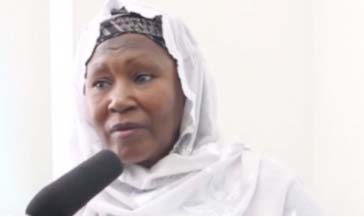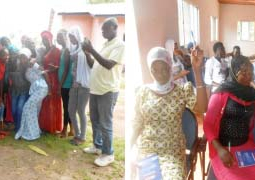
The
Gambia government, in close partnership with three UN agencies, would launch a
project of US$11.4 million tomorrow, Thursday, aimed at improving food security
and reducing stunting among children in North Bank, Lower, Central and Upper
River regions.
The
30-month project, entitled ‘Post-Crisis Response to Food and Nutrition
insecurity in The Gambia’, is funded by the European Union (EU). It would be launched by the overseer of the
Office of the Vice President, Aja Fatoumatta Jallow-Tambajang who is the
minister of Women’s Affairs.
The
project seeks to contribute to household food security and poverty reduction by
strengthening farmer capacity to sustainably improve agricultural production
and productivity, increase the employment and income of vulnerable households
through cash for work, support the treatment of moderately and severely acute
malnourished children, and prevents malnutrition by increasing vulnerable
children’s access to specialised nutritious foods.
It
would provide a total of 2,933 metric tons of specialised nutritious foods to
beneficiaries as well as improve farmers’ capacity to prepare for, withstand
and recover from climatic and other shocks.
A
final component of the project, social behavioural change communications on
health and nutrition, would raise awareness, build knowledge and skills as well
as induce behavioural change to improve nutrition in targeted communities and
households.
The
project is necessitated by the fact that the Gambia Demographic and Health
Survey (DHS) 2013 showed that nearly 1 in 4 children under five were stunted.
Data
from the recently finalised National Nutrition Survey in The Gambia also
suggests that both chronic and acute malnutrition rates are on the increase.
Therefore,
the project targets communities that have stunting rates above the national
average according to the Standardised Monitoring and Assessment of Relief and
Transitions (SMART) Survey, 2015 and supports health centres that are managing
the treatment of acute malnutrition.
The
Food and Agricultural Organisation (FAO), World Food Programme (WFP) and the
United Nations Children’s Fund (UNICEF) would implement the project jointly, in
close partnership with the Department of Agriculture (and its specialised
units), the National Nutrition Agency, the Ministry of Health, the National
Disaster Management Agency, the Gambia Red Cross Society, Farmer Based
Organisations, and the Women’s Health, Productivity and the Environment NGO
(BAFROW).
Read Other Articles In Article (Archive)
Hunger – there are innovative solutions
Jul 17, 2014, 10:32 AM
One Ebola suspect in Senegal
Aug 11, 2014, 9:46 AM


